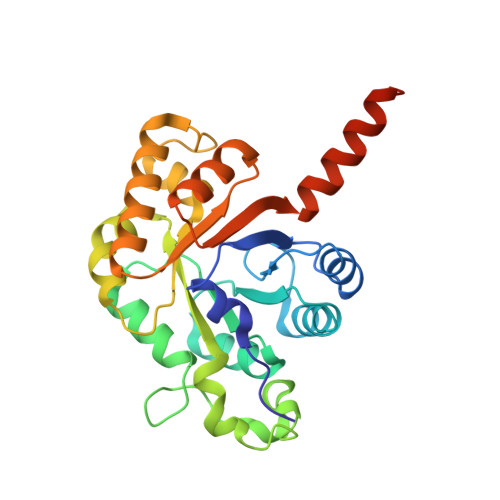Catalytic and structural insights into a stereospecific and thermostable Class II aldolase HpaI from Acinetobacter baumannii.
Watthaisong, P., Binlaeh, A., Jaruwat, A., Lawan, N., Tantipisit, J., Jaroensuk, J., Chuaboon, L., Phonbuppha, J., Tinikul, R., Chaiyen, P., Chitnumsub, P., Maenpuen, S.(2021) J Biological Chem 297: 101280-101280
- PubMed: 34624314
- DOI: https://doi.org/10.1016/j.jbc.2021.101280
- Primary Citation of Related Structures:
7ET8, 7ET9, 7ETA, 7ETB, 7ETC, 7ETD, 7ETE, 7ETF, 7ETG, 7ETH, 7ETI - PubMed Abstract:
Aldolases catalyze the reversible reactions of aldol condensation and cleavage and have strong potential for the synthesis of chiral compounds, widely used in pharmaceuticals. Here, we investigated a new Class II metal aldolase from the p-hydroxyphenylacetate degradation pathway in Acinetobacter baumannii, 4-hydroxy-2-keto-heptane-1,7-dioate aldolase (AbHpaI), which has various properties suitable for biocatalysis, including stereoselectivity/stereospecificity, broad aldehyde utilization, thermostability, and solvent tolerance. Notably, the use of Zn 2+ by AbHpaI as a native cofactor is distinct from other enzymes in this class. AbHpaI can also use other metal ion (M 2+ ) cofactors, except Ca 2+ , for catalysis. We found that Zn 2+ yielded the highest enzyme complex thermostability (T m of 87 °C) and solvent tolerance. All AbHpaI•M 2+ complexes demonstrated preferential cleavage of (4R)-2-keto-3-deoxy-D-galactonate ((4R)-KDGal) over (4S)-2-keto-3-deoxy-D-gluconate ((4S)-KDGlu), with AbHpaI•Zn 2+ displaying the highest R/S stereoselectivity ratio (sixfold higher than other M 2+ cofactors). For the aldol condensation reaction, AbHpaI•M 2+ only specifically forms (4R)-KDGal and not (4S)-KDGlu and preferentially catalyzes condensation rather than cleavage by ∼40-fold. Based on 11 X-ray structures of AbHpaI complexed with M 2+ and ligands at 1.85 to 2.0 Å resolution, the data clearly indicate that the M 2+ cofactors form an octahedral geometry with Glu151 and Asp177, pyruvate, and water molecules. Moreover, Arg72 in the Zn 2+ -bound form governs the stereoselectivity/stereospecificity of AbHpaI. X-ray structures also show that Ca 2+ binds at the trimer interface via interaction with Asp51. Hence, we conclude that AbHpaI•Zn 2+ is distinctive from its homologues in substrate stereospecificity, preference for aldol formation over cleavage, and protein robustness, and is attractive for biocatalytic applications.
- School of Biomolecular Science and Engineering, Vidyasirimedhi Institute of Science and Technology (VISTEC), Rayong, Thailand.
Organizational Affiliation:




















